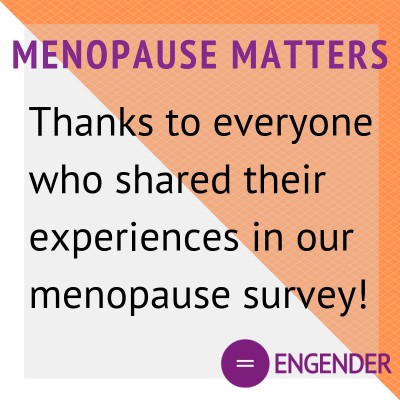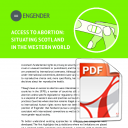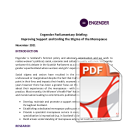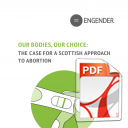Engender blog
Menopause Matters: Ending the stigma

Last week, we said goodbye to our intern Elena Rodriguez, who has been working with Engender to conduct research looking at women’s experiences of the menopause in Scotland as part of her studies at the University of Edinburgh. Elena has been collating the 371 responses we received to our Menopause Matters survey in June, and here she writes to thank all those who took part in survey and explains what the results have revealed so far.
Dear Participants,
Thank you so much for engaging with the survey and sharing it so widely. Today we have 371 different experiences from all over Scotland, and your stories, views and suggestions of what should be done to ending the stigma around the menopause are precious.
We know it is a tough topic to be open about, and that many of you have had painful experiences with health professionals, managers and even family and friends. As many of you told us, it can be a confusing, tiring, frustrating and embarrassing process. We all need to understand it, not just women. We all need to learn about it at a younger age. We all need to be capable of discussing it without minimising it or taking it as a joke. We all need to involve and recognise the people that are struggling with it because many of them are doing so or have done so in silence.
This should not be happening. No woman should feel embarrassed or isolated because of the menopause. Whether it is "at the expected age" or not, natural or as a result of treatments, we cannot tolerate that the shared experiences of respondents are feeling dismissed, confused, feeling they are "going crazy" or being afraid. We have limits to what we can change or stop in biology and the course of life, but we can definitely help both those undergoing the menopause and those in their lives be more prepared and understanding when difficult times come.
Our survey respondents want more information on the menopause to be available to everyone. They think that everyone should know about the common and "not so common" symptoms of the menopause and their effects in body, mind, and soul. They also want access to more and better-prepared health professionals - ones that not only know about the menopause but that are willing to really listen and involve women in the decisions about their bodies. For that, they recognise that appointments should be longer or at specialist clinics.
Those respondents that are or were working provided useful guidelines to improve how menopause is treated in the workplace. Easy adjustments included having access to cold water, a fan or ventilation, a quiet space for breaks, sanitary products, and the cheapest, but more difficult one, empathy from colleagues and managers. They also think that managers need more information and preparation to discuss the topic and that menopause policies should be in place.

It was a long survey, so once again thank you for participating and answering all the questions. We are still working on processing and incorporating knowledge from your answers into our recommendations and future steps. The menopause should not be a negative transition. It has the potential to be a liberating and life-changing experience. But to get there we, as a society, have a lot of work to do, and we can only do it if we listen to the real voices of wisdom, our menopausal and postmenopausal women.
Although she is no longer with us in the office, Elena is now working to analyse all the information we received from hundreds of women. We’ll receive her study in August, but the scale of interest in the survey and the research more generally has meant that Engender is looking at ways to expand the project over the next few months and develop some specific recommendations to improve policy and services for women, so stay tuned for an update on this work.
Share this post on …
Comments: 0 (Add)
Downloads
 Access to Abortion: Situating Scotland in the Western World
This paper describes the different legal and regulatory contexts for abortion healthcare in Scotland and in other European and western nations.
Access to Abortion: Situating Scotland in the Western World
This paper describes the different legal and regulatory contexts for abortion healthcare in Scotland and in other European and western nations.
 Engender Briefing to the Women’s Health Plan: What Do Women Experiencing the Menopause in Scotland Need?
In 2020, the Women’s Health Plan was established with a remit of raising awareness around women’s health; improving access to healthcare for women across the life course and reducing inequalities in health outcomes for girls and women, including gender-based inequalities both for sex-specific conditions and in women’s general health.
Engender Briefing to the Women’s Health Plan: What Do Women Experiencing the Menopause in Scotland Need?
In 2020, the Women’s Health Plan was established with a remit of raising awareness around women’s health; improving access to healthcare for women across the life course and reducing inequalities in health outcomes for girls and women, including gender-based inequalities both for sex-specific conditions and in women’s general health.
 Engender Parliamentary Briefing: Improving Support and Ending the Stigma of the Menopause
This is a briefing for MSPs ahead of the Member's Business Session on Improving Support and Ending the Stigma of the Menopause.
Engender Parliamentary Briefing: Improving Support and Ending the Stigma of the Menopause
This is a briefing for MSPs ahead of the Member's Business Session on Improving Support and Ending the Stigma of the Menopause.
 Engender submission of evidence to the Scottish Parliament Local Government and Communities Committee Call for Evidence on the Period Products (Free Provision) (Scotland) Bill
This document is a submission of written evidence to the Scottish Parliament Local Government and Communities Committee Call for Evidence on the Period Products (Free Provision) (Scotland) Bill.
Engender submission of evidence to the Scottish Parliament Local Government and Communities Committee Call for Evidence on the Period Products (Free Provision) (Scotland) Bill
This document is a submission of written evidence to the Scottish Parliament Local Government and Communities Committee Call for Evidence on the Period Products (Free Provision) (Scotland) Bill.
 Our bodies our rights - Identifying and removing barriers to disabled women's reproductive rights in Scotland
Since 2013, Engender has been working with disabled women and disabled people’s organisations on a project to discuss the key issues facing women and girls in Scotland, and to enable a deeper and richer conversation about reproductive rights.
Our bodies our rights - Identifying and removing barriers to disabled women's reproductive rights in Scotland
Since 2013, Engender has been working with disabled women and disabled people’s organisations on a project to discuss the key issues facing women and girls in Scotland, and to enable a deeper and richer conversation about reproductive rights.
 Our Bodies, Our Choice: The Case for a Scottish Approach to Abortion
The devolution of abortion law as part of the Scotland Act 2016 also provides Scotland with the opportunity to develop a Scottish approach to women’s reproductive rights, incorporating improved, modernised and standardised service provision underpinned by a progressive devolved legal framework.
Our Bodies, Our Choice: The Case for a Scottish Approach to Abortion
The devolution of abortion law as part of the Scotland Act 2016 also provides Scotland with the opportunity to develop a Scottish approach to women’s reproductive rights, incorporating improved, modernised and standardised service provision underpinned by a progressive devolved legal framework.

Newsletter
Sign up to receive our newsletter here:
Sign up to our mailing list
Receive key feminist updates direct to your inbox: